The Health bulletin [serial] - University of North Carolina at Chapel Hill
The Health bulletin [serial] - University of North Carolina at Chapel Hill
The Health bulletin [serial] - University of North Carolina at Chapel Hill
Create successful ePaper yourself
Turn your PDF publications into a flip-book with our unique Google optimized e-Paper software.
ers, 4400 nurses, 4200 engineers and<br />
1200 physicians—equivalent to 40 per-<br />
cent <strong>of</strong> th<strong>at</strong> year's gradu<strong>at</strong>es—emigr<strong>at</strong>-<br />
ed. But symp<strong>at</strong>hy for the n<strong>at</strong>ion's<br />
plight is tempered by the fact th<strong>at</strong> in<br />
the same year, Britian acquired 3300<br />
teachers, 1600 engnieers, 1300 nurses<br />
and 300 physicians from less privileged<br />
n<strong>at</strong>ions. A startling 40 percent <strong>of</strong> the<br />
medical personnel serving in the British<br />
N<strong>at</strong>ional <strong>Health</strong> Service came from<br />
such areas as Pakistan, India and the<br />
West Indies.<br />
Similarly, France has received more<br />
pr<strong>of</strong>essors and physicians from her<br />
former colony, the new African n<strong>at</strong>ion<br />
<strong>of</strong> Togo, than she has sent to th<strong>at</strong><br />
country. France also provides employment<br />
to an estim<strong>at</strong>ed 3500 university-<br />
trained South Vietnamese, who are<br />
desper<strong>at</strong>ely needed in their own hard-<br />
pressed n<strong>at</strong>ion. To compens<strong>at</strong>e for the<br />
flight <strong>of</strong> their own technologists, the<br />
n<strong>at</strong>ions <strong>of</strong> Western Europe employ more<br />
scientists and engineers from Turkey<br />
and the Arab n<strong>at</strong>ions than do their own<br />
countries. And Canada, which lost 920<br />
engineers to the United St<strong>at</strong>es in 1964,<br />
admitted 2000 from abroad th<strong>at</strong> year,<br />
including many hired sight unseen<br />
from Spain and Argentina.<br />
Skimming the Cream. More signific-<br />
ant than the quantity is the quality <strong>of</strong><br />
the pr<strong>of</strong>essionals who migr<strong>at</strong>e. "Every<br />
country is short <strong>of</strong> the brightest people<br />
because God didn't make enough," says<br />
Harry S. H<strong>of</strong>f, consultant to the United<br />
Kingdom Atomic Energy Authority. But<br />
it is these very people who are lured<br />
away.<br />
British science will not easily re-<br />
place 38-year-old medical reseacher<br />
Ian Bush, who in 1964 left for the<br />
Worcester (Mass.) Found<strong>at</strong>ion for Med-<br />
ical Research with his entire staff <strong>of</strong><br />
scientists and technicians. <strong>The</strong> Japanese<br />
electronic industry suffered an equally<br />
severe setback when Dr. Leo Esaki,<br />
developer <strong>of</strong> electronic devices used<br />
throughout the world, took a job with<br />
a U.S. firm.<br />
April, 1967 THE HEALTH BULLETIN<br />
No n<strong>at</strong>ion can afford the continual<br />
loss <strong>of</strong> its most brilliant and productive<br />
minds without suffering severe economic<br />
consequences. <strong>The</strong> effect <strong>of</strong> such<br />
loss on the less developed countries<br />
amounts to "a n<strong>at</strong>ional c<strong>at</strong>astrophe," in<br />
the words <strong>of</strong> Charles V. Kidd, President<br />
Johnson's scientific adviser. Many <strong>of</strong> the<br />
n<strong>at</strong>ions <strong>of</strong> the world are so short <strong>of</strong><br />
trained manpower th<strong>at</strong> a university department<br />
may be forced to close when<br />
a pr<strong>of</strong>essor leaves, children go untaught<br />
when a teacher moves, and thousands<br />
be deprived <strong>of</strong> medical <strong>at</strong>ention when<br />
a physician migr<strong>at</strong>es. Further, in emerg-<br />
ing n<strong>at</strong>ions the pr<strong>of</strong>essionals contitute<br />
th<strong>at</strong> sliver <strong>of</strong> the popul<strong>at</strong>ion which pro-<br />
vides leadership. <strong>The</strong>y are the c<strong>at</strong>alytic<br />
agents for improvement without whom<br />
the n<strong>at</strong>ion stagn<strong>at</strong>es.<br />
Farewell With Regret. A major moti-<br />
v<strong>at</strong>ion in the flight <strong>of</strong> talent is the<br />
desire for an adequ<strong>at</strong>e income. "<strong>The</strong><br />
scientist is enabled to study thanks to<br />
the efforts <strong>of</strong> all his countrymen— farm-<br />
ers, laborers and intellectuals alike,"<br />
Bernardo Houssay, Nobel Prize-winning<br />
biologist, reminded his fellow Argen-<br />
tinians. "He owes it to them to repay<br />
th<strong>at</strong> debt." But the 206 scientists who<br />
left Argentina last year—some <strong>of</strong> whom<br />
earned less than $2000 annually— felt<br />
they could not afford to heed his plea.<br />
An Italian mfcrobiologist <strong>at</strong> Massachusetts<br />
Institute <strong>of</strong> Technology wrote<br />
his sponsors in anguish to explain why<br />
he was breaking his promise to return<br />
home: "I do not expect to live in<br />
luxury, but <strong>at</strong> 32, with two degrees, !<br />
cannot live even decently on the $290<br />
a month <strong>of</strong>fered me in Italy." "I love<br />
Britain, and would like to stay," was<br />
the comment <strong>of</strong> a 40-year-old heart<br />
surgeon to <strong>of</strong>ficial pleas th<strong>at</strong> he remain.<br />
"But Britain won't afford to keep me."


![The Health bulletin [serial] - University of North Carolina at Chapel Hill](https://img.yumpu.com/7806875/57/500x640/the-health-bulletin-serial-university-of-north-carolina-at-chapel-hill.jpg)
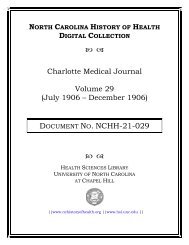

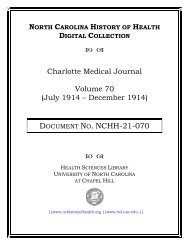
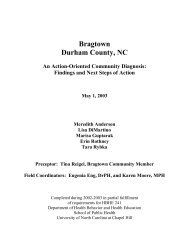
![Bulletin of the North Carolina Board of Health [serial] - University of ...](https://img.yumpu.com/48032016/1/153x260/bulletin-of-the-north-carolina-board-of-health-serial-university-of-.jpg?quality=85)
![The Health bulletin [serial] - University of North Carolina at Chapel Hill](https://img.yumpu.com/47603625/1/169x260/the-health-bulletin-serial-university-of-north-carolina-at-chapel-hill.jpg?quality=85)
![The Health bulletin [serial] - University of North Carolina at Chapel Hill](https://img.yumpu.com/47242858/1/169x260/the-health-bulletin-serial-university-of-north-carolina-at-chapel-hill.jpg?quality=85)
![The Health bulletin [serial] - University of North Carolina at Chapel Hill](https://img.yumpu.com/43204263/1/172x260/the-health-bulletin-serial-university-of-north-carolina-at-chapel-hill.jpg?quality=85)
![The Health bulletin [serial] - University of North Carolina at Chapel Hill](https://img.yumpu.com/41981074/1/163x260/the-health-bulletin-serial-university-of-north-carolina-at-chapel-hill.jpg?quality=85)
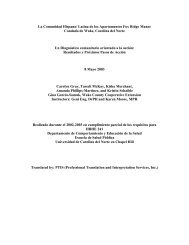
![The Health bulletin [serial] - University of North Carolina at Chapel Hill](https://img.yumpu.com/40912928/1/164x260/the-health-bulletin-serial-university-of-north-carolina-at-chapel-hill.jpg?quality=85)
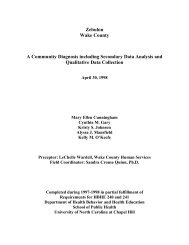
![The Health bulletin [serial] - University of North Carolina at Chapel Hill](https://img.yumpu.com/35643061/1/167x260/the-health-bulletin-serial-university-of-north-carolina-at-chapel-hill.jpg?quality=85)
![Biennial report of the North Carolina State Board of Health [serial]](https://img.yumpu.com/34024350/1/166x260/biennial-report-of-the-north-carolina-state-board-of-health-serial.jpg?quality=85)
